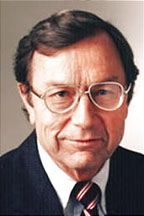Difference between revisions of "Ray Noorda"
(→External links) |
|||
| (One intermediate revision by the same user not shown) | |||
| Line 17: | Line 17: | ||
==External links== | ==External links== | ||
| − | *http://www.canopy.com/raynoorda/ Raymond John Noorda (canopy.com) | + | *[http://www.canopy.com/raynoorda/ Raymond John Noorda (canopy.com)] |
| − | *http://www.whiteworld.com/novstory/surf00.htm Surfing a High Tech Wave: A story of Novell's Early Years 1980-1990 | + | *[http://www.whiteworld.com/novstory/surf00.htm Surfing a High Tech Wave: A story of Novell's Early Years 1980-1990] |
[[Category:Famous Mormons]] | [[Category:Famous Mormons]] | ||
| + | {{DEFAULTSORT:Noorda, Ray}} | ||
Latest revision as of 21:29, 31 July 2021
Raymond John "Ray" Noorda (June 19, 1924, – October 9, 2006) was an Latter-day Saint computer businessman. He was CEO of Novell between 1982 and 1994. He also served as chairman of Novell until he was replaced in 1994. Noorda is credited by many as having coined the term coopetition.Early life
Noorda was born in Ogden, Utah, the third son of Dutch immigrants Bertus and Alida Noorda. He was a lifelong member of The Church of Jesus Christ of Latter-day Saints]. He attended Weber State College in Ogden. During World War II he served in the Navy for two years as an Electronics Technician, working with radar systems. He graduated cum laude with a bachelor’s degree in Engineering from the University of Utah in 1949. Noorda married Lewena (Tye) Taylor on August 4, 1950, and worked for General Electric from graduation until 1971, after which he worked at a number of California companies.
Novell
In 1983 Noorda assembled the SuperSet team whose members included Drew Major, Dale Niebaur, and Kyle Powell. The team was originally assigned to create a CP/M disk sharing system but instead came up with a successful file sharing system for the newly introduced IBM-compatible PC. This Network operating system was later called Novell NetWare. Noorda ran Novell until 1993.
Under Noorda's watch, Novell acquired several companies and products with the goal of countering Microsoft's rapid spread into new markets, including Digital Research, Unix System Laboratories, WordPerfect, and Borland's Quattro Pro. Microsoft CEO Bill Gates claimed that Noorda had a "tremendous vendetta" against Microsoft and had supported the Federal Trade Commission's antitrust investigations of Microsoft in the early 1990s that led to a consent decree restricting its operating system licensing practices.
Later career
Up to his death, Noorda owned the Canopy Group. One of its holdings, Caldera Systems, purchased the Unix assets in 1995 from the Santa Cruz Operation, which had acquired them from Novell. In 1996 it also acquired the Digital Research assets from Novell and immediately brought a lawsuit against Microsoft that largely duplicated the claims that the FTC and Department of Justice had pursued in the early 1990s. The lawsuit was ultimately settled in 2000 with a $275 million payment to Caldera.
Noorda received honorary doctorates from the University of Utah in 1994 and Weber State University in 1995. As a consequence of age and associated health issues (Alzheimer's disease and heart disease), Noorda did not participate in the day-to-day management of Canopy's affairs after 1998. [1]
Noorda had four sons and one daughter. On March 17, 2005, Val Noorda Kreidel, his daughter, committed suicide. She was 49 and left behind her husband, four daughters, and a son [2]. Noorda died October 9, 2006, at his home in Orem, Utah, aged 82.
